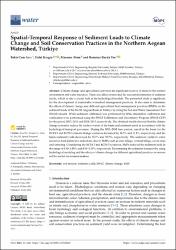| dc.contributor.author | Avcı, Bekir Cem | |
| dc.contributor.author | Kesgin, Erdal | |
| dc.contributor.author | Atam, Masume | |
| dc.contributor.author | Tan, Remziye İlayda | |
| dc.date.accessioned | 2023-07-28T14:10:39Z | |
| dc.date.available | 2023-07-28T14:10:39Z | |
| dc.date.issued | 2023 | en_US |
| dc.identifier.citation | AVCI, Bekir Cem, Erdal KESGİN, Masume ATAM & Remziye İlayda TAN."Spatial-Temporal Response of Sediment Loads to Climate Change and Soil Conservation Practices in the Northern Aegean Watershed, Türkiye." Water, 15.13 (2023):2-19. | en_US |
| dc.identifier.uri | https://www.mdpi.com/2073-4441/15/13/2461 | |
| dc.identifier.uri | https://hdl.handle.net/11352/4627 | |
| dc.description.abstract | Climate change and agricultural activities are significant sources of stress to the natural
environment and water resources. These also affect erosion and the associated estimation of sediment
yields, which is also a crucial task in the hydrological models. The presented study is significant
for the development of sustainable watershed management practices. It also aims to determine
the effects of climate change and different agricultural best management practices (BMPs) on the
sediment loads of the North Aegean Basin in Türkiye by using the Soil and Water Assessment Tool
(SWAT) model. While sediment calibration was performed for 2014, streamflow calibration and
verification were performed using the SWAT Calibration and Uncertainty Program (SWAT-CUP)
for the period 2012–2013 and 2014–2015, respectively. The obtained results showed that the climate
change scenarios reduce the surface waters of the basin and sediment yield in accordance with the
hydrological transport processes. During the 2012–2030 time period, runoff in the basin for the
RCP4.5 and RCP8.5 climate change scenarios decreased by 38.5% and 31.8%, respectively, and the
basin sediment yield decreased by 55.7% and 50.7%, respectively. The sediment yields to water
resources had distinctive reductions due to BMPs such as zero tillage, vertical tillage, cover crop,
and terracing. Considering the RCP4.5 and RCP8.5 scenarios, BMPs reduced the sediment yield in
the range of 0.93–4.03% and 0.89–3.85%, respectively. Determining the sediment transport by using
hydrological modeling and the effects of climate change for different agricultural practices on erosion
will be useful for decision-makers. | en_US |
| dc.language.iso | eng | en_US |
| dc.publisher | Multidisciplinary Digital Publishing Institute (MDPI) | en_US |
| dc.relation.isversionof | 10.3390/w15132461 | en_US |
| dc.rights | info:eu-repo/semantics/openAccess | en_US |
| dc.subject | Soil Erosion | en_US |
| dc.subject | Sediment Yield | en_US |
| dc.subject | SWAT | en_US |
| dc.subject | Climate Change | en_US |
| dc.subject | BMP | en_US |
| dc.title | Spatial-Temporal Response of Sediment Loads to Climate Change and Soil Conservation Practices in the Northern Aegean Watershed, Türkiye | en_US |
| dc.type | article | en_US |
| dc.relation.journal | Water | en_US |
| dc.contributor.department | FSM Vakıf Üniversitesi, Mühendislik Fakültesi, İnşaat Mühendisliği Bölümü | en_US |
| dc.contributor.authorID | https://orcid.org/0000-0002-9441-5359 | en_US |
| dc.contributor.authorID | https://orcid.org/0000-0001-9135-1698 | en_US |
| dc.identifier.volume | 15 | en_US |
| dc.identifier.issue | 13 | en_US |
| dc.identifier.startpage | 2 | en_US |
| dc.identifier.endpage | 19 | en_US |
| dc.relation.publicationcategory | Makale - Uluslararası Hakemli Dergi - Kurum Öğretim Elemanı | en_US |
| dc.contributor.institutionauthor | Tan, Remziye İlayda | |



















